北京课改版三年级英语下册全册知识点归纳与整理
- 格式:docx
- 大小:65.56 KB
- 文档页数:10
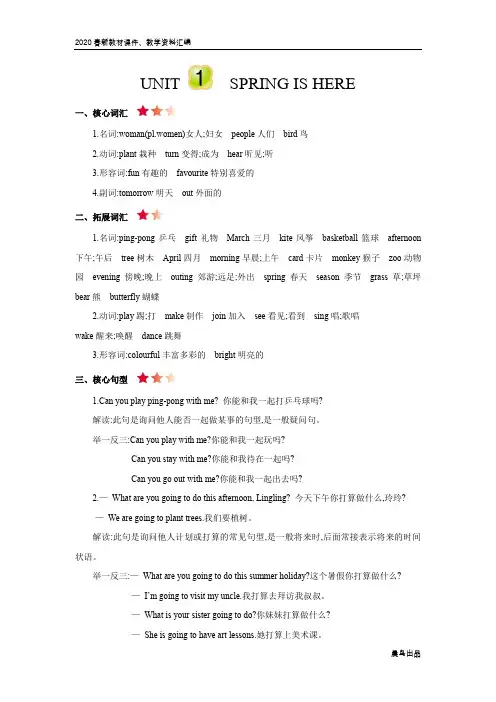
UNIT SPRING IS HERE一、核心词汇1.名词:woman(pl.women)女人;妇女people人们bird鸟2.动词:plant栽种turn变得;成为hear听见;听3.形容词:fun有趣的favourite特别喜爱的4.副词:tomorrow明天out外面的二、拓展词汇1.名词:ping-pong乒乓gift礼物March三月kite风筝basketball篮球afternoon 下午;午后tree树木April四月morning早晨;上午card卡片monkey猴子zoo动物园evening傍晚;晚上outing郊游;远足;外出spring春天season季节grass草;草坪bear熊butterfly蝴蝶2.动词:play踢;打make制作join加入see看见;看到sing唱;歌唱wake醒来;唤醒dance跳舞3.形容词:colourful丰富多彩的bright明亮的三、核心句型1.Can you play ping-pong with me? 你能和我一起打乒乓球吗?解读:此句是询问他人能否一起做某事的句型,是一般疑问句。
举一反三:Can you play with me?你能和我一起玩吗?Can you stay with me?你能和我待在一起吗?Can you go out with me?你能和我一起出去吗?2.—What are you going to do this afternoon, Lingling? 今天下午你打算做什么,玲玲?—We are going to plant trees.我们要植树。
解读:此句是询问他人计划或打算的常见句型,是一般将来时,后面常接表示将来的时间状语。
举一反三:—What are you going to do this summer holiday?这个暑假你打算做什么?—I’m going to visit my uncle.我打算去拜访我叔叔。
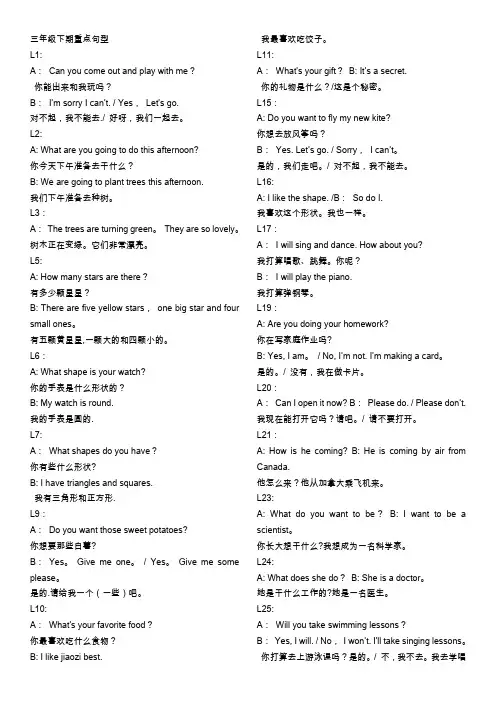
三年级下期重点句型L1:A:Can you come out and play with me?你能出来和我玩吗?B:I’m sorry I can’t. / Yes,Let's go.对不起,我不能去./ 好呀,我们一起去。
L2:A: What are you going to do this afternoon?你今天下午准备去干什么?B: We are going to plant trees this afternoon.我们下午准备去种树。
L3:A:The trees are turning green。
They are so lovely。
树木正在变绿。
它们非常漂亮。
L5:A: How many stars are there?有多少颗星星?B: There are five yellow stars,one big star and four small ones。
有五颗黄星星,一颗大的和四颗小的。
L6:A: What shape is your watch?你的手表是什么形状的?B: My watch is round.我的手表是圆的.L7:A:What shapes do you have?你有些什么形状?B: I have triangles and squares.我有三角形和正方形.L9:A:Do you want those sweet potatoes?你想要那些白薯?B:Yes。
Give me one。
/ Yes。
Give me some please。
是的.请给我一个(一些)吧。
L10:A:What's your favorite food?你最喜欢吃什么食物?B: I like jiaozi best.我最喜欢吃饺子。
L11:A:What's your gift?B: It’s a secret.你的礼物是什么?/这是个秘密。
L15:A: Do you want to fly my new kite?你想去放风筝吗?B:Yes. Let’s go. / Sorry,I can’t。
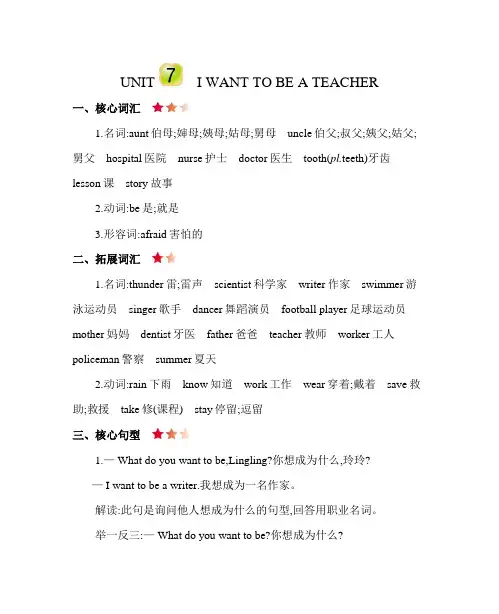
UNIT I WANT TO BE A TEACHER一、核心词汇1.名词:aunt伯母;婶母;姨母;姑母;舅母uncle伯父;叔父;姨父;姑父;舅父hospital医院nurse护士doctor医生tooth(pl.teeth)牙齿lesson课story故事2.动词:be是;就是3.形容词:afraid害怕的二、拓展词汇1.名词:thunder雷;雷声scientist科学家writer作家swimmer游泳运动员singer歌手dancer舞蹈演员football player足球运动员mother妈妈dentist牙医father爸爸teacher教师worker工人policeman警察summer夏天2.动词:rain下雨know知道work工作wear穿着;戴着save救助;救援take修(课程)stay停留;逗留三、核心句型1.— What do you want to be,Lingling?你想成为什么,玲玲?— I want to be a writer.我想成为一名作家。
解读:此句是询问他人想成为什么的句型,回答用职业名词。
举一反三:— What do you want to be?你想成为什么?— I want to be a policeman.我想成为一名警察。
— What does your sister want to be?你妹妹想成为什么?— She wants to be a famous writer like Mo Yan.她想成为像莫言一样的著名作家。
2.— What does your father do?你爸爸是做什么的?— He is a teacher.他是一名教师。
解读:此句是询问他人是做什么的句型,回答用职业名词。
举一反三:— What does your father do?你爸爸是做什么的?— He is a bus driver.他是一名公共汽车司机。
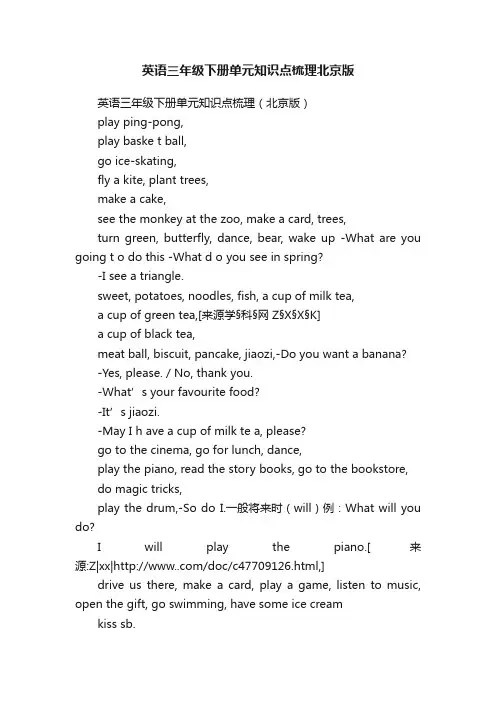
英语三年级下册单元知识点梳理北京版英语三年级下册单元知识点梳理(北京版)play ping-pong,play baske t ball,go ice-skating,fly a kite, plant trees,make a cake,see the monkey at the zoo, make a card, trees,turn green, butterfly, dance, bear, wake up -What are you going t o do this -What d o you see in spring?-I see a triangle.sweet, potatoes, noodles, fish, a cup of milk tea,a cup of green tea,[来源学§科§网Z§X§X§K]a cup of black tea,meat ball, biscuit, pancake, jiaozi,-Do you want a banana?-Yes, please. / No, thank you.-What’s your favourite food?-It’s jiaozi.-May I h ave a cup of milk te a, please?go to the cinema, go for lunch, dance,play the piano, read the story books, go to the bookstore,do magic tricks,play the drum,-So do I.一般将来时(will)例:What will you do?I will play the piano.[来源:Z|xx|/doc/c47709126.html,]drive us there, make a card, play a game, listen to music, open the gift, go swimming, have some ice creamkiss sb.give sb. a big hug,-Will Dad drive us there?-Yes, he will.-What are you doing?-I am making a card.-Can I open the gift now?-Please do. / Please don’t.[a?]ou: mouse, proud, outow:owl, now, town一般将来时(will)例:Will dad drive us there?Yes, he will.正在进行时be + doing例:Wha t are you doing?I’m making a card.singer, football player, teacher, -What do you want to do?[a??]询问志向例:What do you want to be?I want to be a writer.。
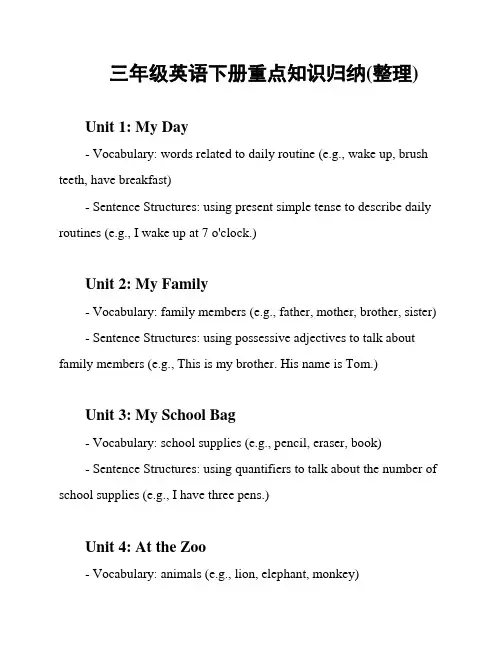
三年级英语下册重点知识归纳(整理)Unit 1: My Day- Vocabulary: words related to daily routine (e.g., wake up, brush teeth, have breakfast)- Sentence Structures: using present simple tense to describe daily routines (e.g., I wake up at 7 o'clock.)Unit 2: My Family- Vocabulary: family members (e.g., father, mother, brother, sister) - Sentence Structures: using possessive adjectives to talk about family members (e.g., This is my brother. His name is Tom.)Unit 3: My School Bag- Vocabulary: school supplies (e.g., pencil, eraser, book)- Sentence Structures: using quantifiers to talk about the number of school supplies (e.g., I have three pens.)Unit 4: At the Zoo- Vocabulary: animals (e.g., lion, elephant, monkey)- Sentence Structures: using the verb "can" to talk about the abilities of animals (e.g., A monkey can climb trees.)Unit 5: Our Body- Vocabulary: parts of the body (e.g., head, arm, leg)- Sentence Structures: using "have got" to describe body features (e.g., I have got short hair.)Unit 6: Festivals- Vocabulary: festivals (e.g., Christmas, New Year, Halloween)- Sentence Structures: using present simple tense to talk about festival traditions (e.g., We celebrate Christmas on December 25th.)Unit 7: Food and Drinks- Vocabulary: food and drinks (e.g., apple, hamburger, juice)- Sentence Structures: using "like" and "don't like" to express food preferences (e.g., I like pizza, but I don't like vegetables.)Unit 8: Weather- Vocabulary: weather conditions (e.g., sunny, rainy, windy)- Sentence Structures: using present simple tense to describe the weather (e.g., It is sunny today.)以上是三年级英语下册的重点知识归纳,希望能够对同学们的学习有所帮助。
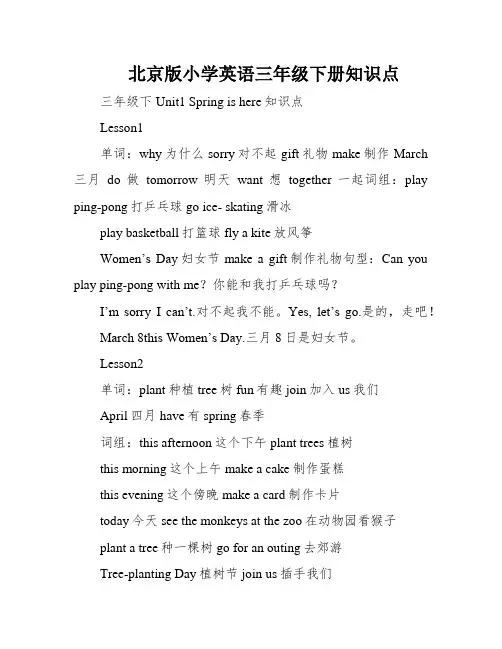
北京版小学英语三年级下册知识点三年级下Unit1 Spring is here知识点Lesson1单词:why为什么sorry对不起gift礼物make制作March 三月do做tomorrow明天want想together一起词组:play ping-pong打乒乓球go ice- skating滑冰play basketball打篮球fly a kite放风筝Women’s Day妇女节make a gift制作礼物句型:Can you play ping-pong with me?你能和我打乒乓球吗?I’m sorry I can’t.对不起我不能。
Yes, let’s go.是的,走吧!March 8this Women’s Day.三月8日是妇女节。
Lesson2单词:plant种植tree树fun有趣join加入us我们April四月have有spring春季词组:this afternoon这个下午plant trees植树this morning这个上午make a cake制作蛋糕this evening这个傍晚make a card制作卡片today今天see the monkeys at the zoo在动物园看猴子plant a tree种一棵树go for an outing去郊游Tree-planting Day植树节join us插手我们In the U.S.在美国in April在四月句型:What are you going to do this afternoon?这个下午你打算做什么?We are going to plant trees.我们计划去植树。
March 12this Tree-planting Day.三月12日是植树节。
Lesson3单词:here这里many很多thing事物favourite最爱好的people人hear听bears熊butterflies蝴蝶dance舞蹈grass草词组:well done做的好/真棒turn green变绿wake up睡醒many things很多事物in spring在春季birds sing鸟唱歌favourite season季节come out出来句型:What do you see in spring?在春天你看到了什么?The trees turn green.树变绿了。
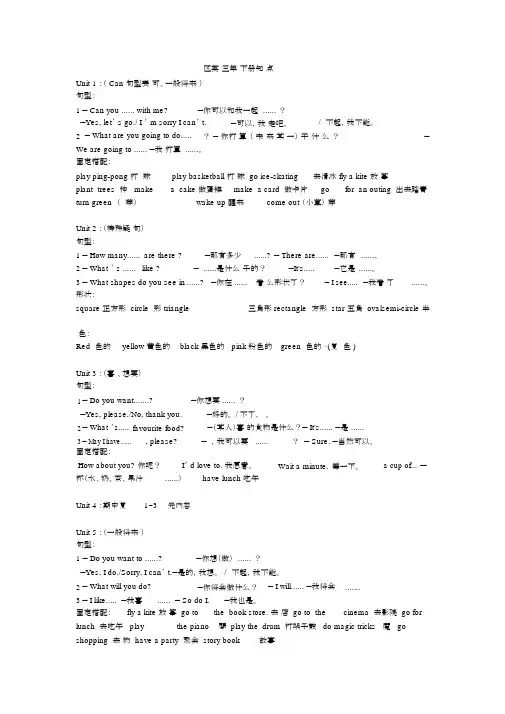
区英三年下册知点Unit 1 :( Can 句型表可、一般将来)句型:1 — Can you ...... with me? —你可以和我一起 ......?—Yes, let’ s go./ I ’ m sorry I can’ t. —可以,我走吧。
/ 不起,我不能。
2 — What are you going to do..... ?—你打算(未来某一)干什么?—We are going to ...... —我打算 ......。
固定搭配:play ping-pong 打球play basketball 打球 go ice-skating 去滑冰 fly a kite 放筝plant trees 种 make a cake 做蛋糕make a card 做卡片go for an outing 出去踏青turn green (芽)wake up 醒来come out (小草)芽Unit 2 :(特殊疑句)句型:1 — How many...... are there ? —那有多少......? — There are...... —那有......。
2 — What ’ s ...... like ? —......是什么子的?—It's..... —它是......。
3 — What shapes do you see in ......? —你在 ...... 看么形状了?— I see..... —我看了......。
形状:square 正方形 circle 形 triangle 三角形 rectangle 方形 star 五角 ovalsemi-circle 半色:Red 色的yellow 黄色的black 黑色的pink 粉色的green 色的⋯(复色 )Unit 3 :(喜、想要)句型:1 — Do you want.......? —你想要 ......?—Yes, please./No, thank you. —好的。

三年级英语知识点归纳总结北京版三年级英语知识点归纳总结(北京版)英语是三年级学生进行语言学习的一门重要学科,它帮助学生建立起对英语的基本认知和语言表达能力。
本文将对三年级英语的教学内容进行归纳总结,帮助学生和家长更好地了解学习内容和进度。
一、单词与词组1. 数字:one, two, three, four, five, six, seven, eight, nine, ten2. 颜色:red, yellow, blue, green, orange, pink, purple, black, white3. 学校用品:book, pencil, pen, eraser, ruler, backpack4. 家庭成员:father, mother, brother, sister, grandfather, grandmother5. 动物:cat, dog, bird, fish, rabbit, turtle, lion, tiger6. 水果:apple, banana, orange, strawberry, watermelon, grape7. 季节:spring, summer, autumn, winter8. 天气:sunny, cloudy, rainy, snowy, windy二、基本句型与语法1. 祈使句:Sit down. Stand up. Open the book. Close the door.2. 人称代词:I, you, he, she, it, we, they3. 一般现在时:主语+动词原形(第三人称单数需加-s)4. 名词所有格:'s5. 介词in和on的使用:in the classroom, on the desk6. 询问身份:What's your name? My name is...7. 询问感受:How are you? I'm fine/good/happy.8. 问答句:Is it a...? Yes, it is. / No, it isn't.9. 物品的位置和数量:There is/are... 在...三、日常用语与对话1. 问候与告别:Hello. Hi. Goodbye. Bye-bye.2. 自我介绍:My name is... I'm... years old.3. 询问与回答年龄:How old are you? I'm... years old.4. 询问与回答喜欢的事物:What's your favorite color/food/animal? My favorite... is...5. 请求与回答允许:May I...? Yes, you may. / No, you may not.6. 接受与拒绝邀请:Would you like to...? Yes, I would. / No, I wouldn't.四、阅读与写作1. 识别字母及大小写:A-Z, a-z2. 基本的拼读与发音规则:例如,字母组合ch, sh, th, wh, ee, ou的发音规则3. 基础的阅读和书写练习:学生通过阅读简单的句子和短文来提高英语理解能力,同时进行书写练习,逐步提升书写准确性和速度。
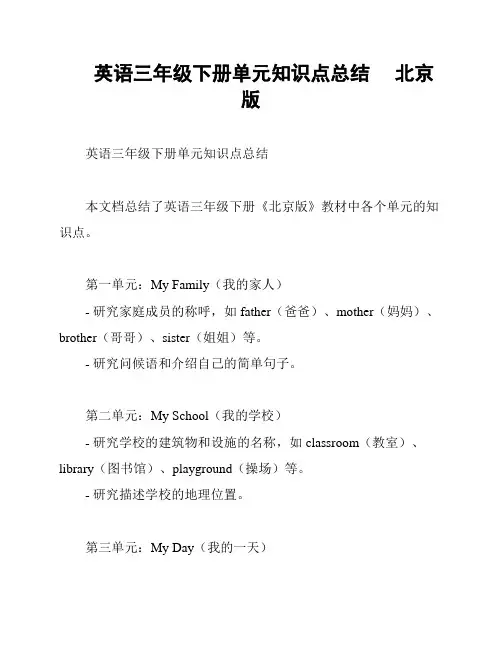
英语三年级下册单元知识点总结北京版英语三年级下册单元知识点总结本文档总结了英语三年级下册《北京版》教材中各个单元的知识点。
第一单元:My Family(我的家人)- 研究家庭成员的称呼,如father(爸爸)、mother(妈妈)、brother(哥哥)、sister(姐姐)等。
- 研究问候语和介绍自己的简单句子。
第二单元:My School(我的学校)- 研究学校的建筑物和设施的名称,如classroom(教室)、library(图书馆)、playground(操场)等。
- 研究描述学校的地理位置。
第三单元:My Day(我的一天)- 研究一天的时间表,包括早上(morning)、中午(noon)、下午(afternoon)、晚上(evening)等。
- 研究描述日常活动,如eat breakfast(吃早餐)、go to school (去学校)、play with friends(和朋友玩)等。
第四单元:My Toys(我的玩具)- 研究玩具的名称,如ball(球)、doll(玩偶)、car(汽车)等。
- 研究描述玩具的外观和颜色。
第五单元:My Clothes(我的衣服)- 研究衣物的名称,如T-shirt(T恤衫)、trousers(裤子)、shoes(鞋子)等。
- 研究描述衣物的颜色。
第六单元:My Food(我的食物)- 研究常见食物的名称,如apple(苹果)、banana(香蕉)、cake(蛋糕)等。
- 研究描述食物的味道,如sweet(甜)、sour(酸)、spicy (辣)等。
第七单元:My House(我的房子)- 研究房子的各个部分的名称,如bedroom(卧室)、kitchen (厨房)、bathroom(浴室)等。
- 研究描述房子的大小和形状。
第八单元:My Garden(我的花园)- 研究花园中常见植物的名称,如flower(花)、tree(树)、grass(草)等。
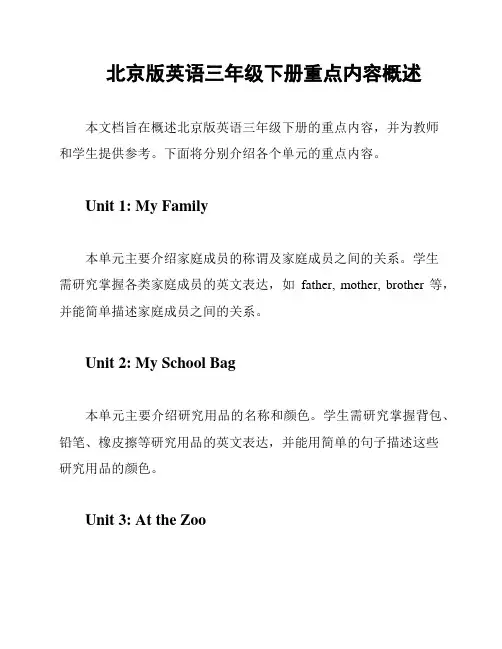
北京版英语三年级下册重点内容概述本文档旨在概述北京版英语三年级下册的重点内容,并为教师和学生提供参考。
下面将分别介绍各个单元的重点内容。
Unit 1: My Family本单元主要介绍家庭成员的称谓及家庭成员之间的关系。
学生需研究掌握各类家庭成员的英文表达,如father, mother, brother等,并能简单描述家庭成员之间的关系。
Unit 2: My School Bag本单元主要介绍研究用品的名称和颜色。
学生需研究掌握背包、铅笔、橡皮擦等研究用品的英文表达,并能用简单的句子描述这些研究用品的颜色。
Unit 3: At the Zoo本单元主要介绍动物园中的各种动物。
学生需研究掌握狮子、大象、长颈鹿等动物的英文表达,并能用简单的句子描述这些动物的特征。
Unit 4: My Day本单元主要介绍一天中的各个时间段及相应的活动。
学生需研究掌握早上、中午、晚上等时间段的英文表达,并能用简单的句子描述在这些时间段里的活动。
Unit 5: My Clothes本单元主要介绍各种服装的名称和颜色。
学生需研究掌握T恤、裤子、鞋子等服装的英文表达,并能用简单的句子描述这些服装的颜色和款式。
Unit 6: At the Supermarket本单元主要介绍超市中的各种食物和饮料。
学生需研究掌握苹果、香蕉、牛奶等食物和饮料的英文表达,并能用简单的句子描述这些食物和饮料的味道。
Unit 7: My Body本单元主要介绍人体各个部位的名称。
学生需研究掌握头、眼睛、耳朵等身体部位的英文表达,并能用简单的句子描述这些身体部位的功能。
Unit 8: My Toy本单元主要介绍各种玩具的名称和颜色。
学生需研究掌握玩具车、玩具熊、玩具球等玩具的英文表达,并能用简单的句子描述这些玩具的颜色和形状。
以上为北京版英语三年级下册的重点内容概述,希望对教师和学生有所帮助。
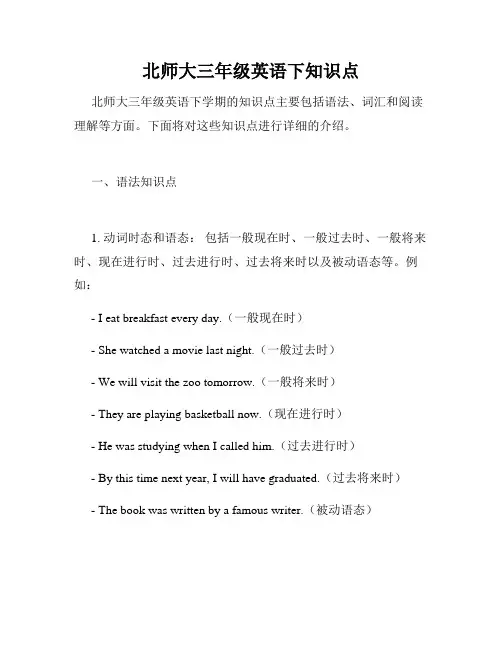
北师大三年级英语下知识点北师大三年级英语下学期的知识点主要包括语法、词汇和阅读理解等方面。
下面将对这些知识点进行详细的介绍。
一、语法知识点1. 动词时态和语态:包括一般现在时、一般过去时、一般将来时、现在进行时、过去进行时、过去将来时以及被动语态等。
例如:- I eat breakfast every day.(一般现在时)- She watched a movie last night.(一般过去时)- We will visit the zoo tomorrow.(一般将来时)- They are playing basketball now.(现在进行时)- He was studying when I called him.(过去进行时)- By this time next year, I will have graduated.(过去将来时)- The book was written by a famous writer.(被动语态)2. 人称代词:主要包括主格代词和宾格代词,如I, you, he, she, it, we, they等。
例如:- I am a student.(主格代词)- She invited me to her party.(宾格代词)3. 疑问句:包括一般疑问句、特殊疑问句和选择疑问句等。
例如:- Do you like playing soccer?(一般疑问句)- Where is the library?(特殊疑问句)- Would you like tea or coffee?(选择疑问句)4. 数词:包括基数词和序数词,如one, two, three等。
例如:- There are five cats in the garden.(基数词)- This is the first time I've been to Beijing.(序数词)二、词汇知识点1. 时态动词:包括常见的动词及其过去式和过去分词形式。
千里之行,始于足下。
202X年北京版英语三班级下册学问点总结一班级起点202X年北京版英语三班级下册的学问点总结如下:一、单词和词组1. 名词:cat(猫)、dog(狗)、bird(鸟)、book(书)等。
2. 形容词:big(大)、small(小)、happy(快活)、sad(难过)等。
3. 动词:eat(吃)、drink(喝)、run(跑)、jump(跳)等。
4. 数词:one(一)、two(二)、three(三)等。
5. 人称代词:I(我)、you(你)、he(他)、she(她)等。
6. 介词:in(在)、on(在…上)、under(在…下面)、next to(在…旁边)等。
7. 时间词:yesterday(昨天)、today(今日)、tomorrow(明天)等。
8. 问句:What's your name?(你叫什么名字?)、How old are you?(你多大年纪?)等。
二、句型1. 简洁句:主语+谓语,如I am a student.(我是一个同学。
)第1页/共3页锲而不舍,金石可镂。
2. 一般疑问句:助动词(is、are、do、does等)+主语+谓语,如Areyou a student?(你是同学吗?)3. 简洁回答:Yes, I am. / No, I'm not.(是的,我是。
/不,我不是。
)4. 简洁否定句:主语+助动词(is、am、are、do、does等)+not+谓语,如I do not like cats.(我不宠爱猫。
)三、日常用语1. 问候语:Hello!(你好!)、Good morning!(早上好!)、Good afternoon!(下午好!)等。
2. 道别语:Goodbye!(再见!)、See you later!(待会见!)等。
3. 感谢语:Thank you!(感谢!)、You're welcome!(不客气!)等。
4. 恳求语:Can I have some water, please?(请给我一些水好吗?)等。
北京版英语三年级下册关键知识总结
本文档总结了北京版英语三年级下册的关键知识。
以下是每个单元的重点内容:
Unit 1: My School
研究了校园里的建筑物名称和教室里的物品
学会了询问位置和提供位置的表达方式
Unit 2: My Home
研究了家庭成员的称呼和身体部位的名称
掌握了描述房屋和家具的词汇
Unit 3: Family Fun
学会了描述周末家庭活动的动词短语
研究了表示时间的词汇和句型
Unit 4: Food and Drinks
掌握了水果、蔬菜和饮料的名称
研究了描述食物口味和喜好的形容词
Unit 5: At the Park
研究了公园里的活动和器材的名称
掌握了询问和回答喜欢做什么的句型
Unit 6: Animals
掌握了常见动物的名称和形容词
学会了表达关于动物的特点和喜好的句子
Unit 7: Clothes
研究了不同种类的服装和颜色的词汇
掌握了描述服装的形容词和句型
Unit 8: ___
学会了描述天气的词汇和句子
研究了表示季节和天气状况的短语
Unit 9: Sports Day
掌握了不同种类的运动项目的名称
研究了表达对运动的喜好和能力的句子
Unit 10: Review
复了本学期学过的主要内容和语法知识
以上是北京版英语三年级下册的关键知识总结。
希望对您有所帮助!。
英语三年级下册单元知识点梳理(北京版)play ping-pong,play baske t ball,go ice-skating,fly a kite, plant trees,make a cake,see the monkey at the zoo, make a card, trees,turn green, butterfly, dance, bear, wake up -Can you play ping-pong with me?-I’m sorry I can’t. / Yes, let’s go.-What are you going t o do this afternoon?-We are going to plant trees.-What d o you see in spring?-The trees turn green.-I see a triangle.sweet, potatoes, noodles, fish, a cup of milk tea,a cup of green tea,a cup of black tea,meat ball, biscuit, pancake, jiaozi,-Do you want a banana?-Yes, please. / No, thank you.-What’s your favourite food?-It’s jiaozi.-May I h ave a cup of milk te a, please?go to the cinema, go for lunch, dance,play the piano, read the story books, go to the bookstore,do magic tricks,play the drum,-So do I.一般将来时(will)例:What will you do?I will play the piano.drive us there, make a card, play a game, listen to music, open the gift, go swimming, have some ice creamkiss sb.give sb. a big hug,-Will Dad drive us there?-Yes, he will.-What are you doing?-I am making a card.-Can I open the gift now?-Please do. / Please don’t.[aʊ]ou: mouse, proud, outow:owl, now, town一般将来时(will)例:Will dad drive us there?Yes, he will.正在进行时be + doing例:Wha t are you doing?I’m making a card.singer, football player, teacher, -What do you want to do?[aʊə]询问志向例:What do you want to be?I want to be a writer.。
北京课改实验教材-小学英语三年级下课文重点句式,词组及单词表Unit One I LIKE SPRING★Can you come out and play with me?I’m sorry I can’t. / Y es, let’s go.★What are you going to do this afternoon?We are going to plant trees this afternoon.(to see grandma, to make a cake, to see the monkeys in the zoo, to swim in the sea)★The trees are turning green.They are so lovely.Unit Two THINGS ARE DIFFERENT★How many stars are there?There are five yellow stars, one big star and four small ones.★What shape is your watch?My watch is round.★What shapes do you have?I have triangles and squares.Look and read(单词词组)(a star, a flag, a watch, a gift, a picture, shapes, a triangle, a square, a rectangle)Unit Three WHAT’S YOUR FA VORITE FOOD?★Do you want those sweet potatoes?Y es. Give me one / some, please.★What’s your favorite food?I like jiaozi best.★What’s your gift?It’s a secret.Look and read(单词词组)(biscuits, a hot dog, a sweet potato, a cherry pie / May day, a tomato, chicken, strawberries / Mother’s Day, a box of chocolate, a lady’s watch, a scarf/scarves)Unit Four REVISIONthis potato these potatoesthat tomato those tomatoesthis cherry these cherriesthat strawberry those strawberriesthis man those menthat woman these womenthis scarf those scarvesthat leaf these leavesUnit Five CHILDREN’S DAY★Do you want to fly my new kites?Y es. Let’s go. / Sorry I can’t.★I like the shape.So do I.★I will sing and dance. How about you?I will play the piano.Look and read(单词词组)(Children’s Day, a kite, see a film / a dictionary, a pencil case, a pair of roller-skates / play the flute, play accordion, play the violin, play the fiddle)Unit Six FATHER’S DAY★Are you doing your homework?Y es, I am. / No, I’m not. I’m making a card.★Can I open it now?Please do. / Please don’t.★How is he coming?★He is coming by car from Canada.Look and read(单词词组)(Father’s Day, a word, read, write / open, close, a tie, a wallet / July, Canada, by air, by train)Unit Seven WHAT DO YOU WANT TO BE?★What do you want to be?I want to be a scientist.★What does she do?She is a doctor.★Will you take swimming lessons?Y es, I will. / No, I won’t. I’ll take singing lessons.Look and read(单词词组)(a cook, a scientist, a writer, a driver / a PLA soldier, a nurse, a dentist, a policeman/a policewoman / a player, a swimmer, a worker, a farmer)Unit Eight REVISIONMatch Column A with Column BA BJune Army DaySeptember Father’s DayAugust Children’s DayTeachers’ Day单词表。
UNIT CHILDREN’S DAY一、核心词汇1.名词:child(pl.children)儿童;孩子kite风筝song歌,歌曲voice嗓音pencil case铅笔盒;笔袋water水bottle瓶2.动词:fly放(风筝等);飞,飞行dance跳舞look看起来二、拓展词汇1.名词:park公园bookstore书店cinema电影院lunch午餐;午饭piano钢琴drum鼓trick恶作剧;把戏story book故事书2.动词短语:go to the park去公园go shopping去购物fly my new kite放我的新风筝go to the cinema去电影院go to the bookstore去书店go for lunch去吃午饭sing a song唱歌play the piano弹钢琴play the drum敲鼓do magic tricks变魔术have a party举办聚会三、核心句型1.— Mike, do you want to fly my new kite? 迈克,你想放我的新风筝吗?— Yes, I do!是的,我想!解读:这是询问他人是否想要做某事的句型。
此句是一般疑问句,want后接动词不定式,多用“Yes.”“No.”来回答。
举一反三:— Do you want to climb the mountain?你想爬山吗?— Yes,I do.是的,我想。
— Do you want to write a letter to your parents?你想给你父母写信吗?— No, I don’t.I want to send an email. 不,我不想。
我想发一封电子邮件。
2.— I will dance.How about you, Mike? 我要跳舞。
你呢,迈克?— I will play the piano.我要弹钢琴。
解读:此句是在叙述完自己的情况之后,询问他人的句型,为了避免重复,常用“How about you?”来代替问句。
北师大版三年级英语下册知识点概括(学生打印版)本文档概括了北师大版三年级英语下册的知识点。
下面是每个单元的知识点总结:Unit 1 - My School Life研究表达介绍自己的话语研究询问他人关于学校生活的问题研究描述学校和教室的事物研究关于日常活动的动词短语Unit 2 - My Family研究家庭成员的称谓和介绍家庭成员研究询问和回答关于家庭成员的问题研究描述家庭成员的外貌特征和个性Unit 3 - My Hobbies研究表达自己的爱好和兴趣研究询问他人的爱好和兴趣研究描述自己和他人的爱好和兴趣Unit 4 - At the Park研究描述公园中的事物和活动研究询问和回答关于公园的问题研究日常交际用语和短语Unit 5 - On the Farm研究描述农场中的动物和事物研究询问和回答关于农场的问题研究数字和农场的地理位置Unit 6 - Our Community研究描述社区中的地点和人物研究询问和回答关于社区的问题研究如何提出和接受邀请Unit 7 - Shopping Time研究描述购物场景和商品研究询问和回答关于购物的问题研究货币和购物交际用语Unit 8 - Our Earth研究描述地球的自然环境和气候研究询问和回答关于地球的问题研究日常交际用语和短语Unit 9 - Let's ___研究描述旅行目的地和交通方式研究询问和回答关于旅行的问题研究问路和给出指示的表达方式Unit 10 - Party Time研究描述派对活动和食物研究询问和回答关于派对的问题研究问候和道别的表达方式以上是北师大版三年级英语下册的知识点概括。
希望对学生们的学习有所帮助!。
UNIT SPRINGISHERE一、核心词汇1.名词:woman(pl.women)女人;妇女people人们bird鸟2.动词:plant栽种turn变得;成为hear听见;听3.形容词:fun有趣的favourite特别喜爱的4.副词:tomorrow明天out外面的二、拓展词汇1.名词:ping-pong乒乓gift礼物March三月kite风筝basketball篮球afternoon下午;午后tree树木April四月morning早晨;上午card卡片monkey猴子zoo动物园evening傍晚;晚上outing郊游;远足;外出spring春天season季节grass草;草坪bear熊butterfly蝴蝶2.动词:play踢;打make制作join加入see看见;看到sing唱;歌唱wake醒来;唤醒dance跳舞3.形容词:colourful丰富多彩的bright明亮的三、核心句型1.Canyouplayping-pongwithme?你能和我一起打乒乓球吗?解读:此句是询问他人能否一起做某事的句型,是一般疑问句。
举一反三:Canyouplaywithme?你能和我一起玩吗?Canyoustaywithme?你能和我待在一起吗?Canyougooutwithme?你能和我一起出去吗?2.—Whatareyougoingtodothisafternoon,Lingling?今天下午你打算做什么,玲玲?—Wearegoingtoplanttrees.我们要植树。
解读:此句是询问他人计划或打算的常见句型,是一般将来时,后面常接表示将来的时间状语。
举一反三:—Whatareyougoingtodothissummerholiday?这个暑假你打算做什么?—I’mgoingtovisitmyuncle.我打算去拜访我叔叔。
—Whatisyoursistergoingtodo?你妹妹打算做什么?—Sheisgoingtohaveartlessons.她打算上美术课。
3.—Whatdoyouseeinspring?你在春天看到什么?—Thetreesturngreen.树木变绿。
解读:这是询问他人能看到什么的句型,答语根据实际情况回答。
举一反三:—Whatdoyouseeonthetrain?在火车上你看到什么?—Amanplayscardswithhisfriends.一个男人和他的朋友打牌。
四、拓展句型1.I’mmakingagiftformymum.我正在给我妈妈做礼物。
解读:此句是现在进行时的句子,用来描述现在正在进行的动作或状态。
举一反三:Mysisterisdoingherhomework.我妹妹在做作业。
Mybrotherisplayingwithhistoyplane.我弟弟在玩他的玩具飞机。
2.—DoyouhaveTree-plantingDay?你们有植树节吗?—Yes.是的。
解读:这是询问某人是否有某个节日的句型。
还可以用来询问他人是否有某物。
句中的have是动词,意为“有;拥有”,后面接名词。
举一反三:—Doyouhaveabasketball?你们有篮球吗?—No,wedon’t.Wehaveaping-pongball.不,我们没有。
我们有一个乒乓球。
UNIT ILIKETHESHAPE一、核心词汇1.名词:flag旗watch手表shape形状circle圆圈;环状物ship轮船2.动词:try试3.表示颜色的单词:yellow黄色的black黑色的4.表示形状的单词:square正方形的round圆的5.副词:now现在6.介词:from来自,从……来二、拓展词汇1.名词:star星星pencil铅笔cat猫monkey猴子box盒子clock闹钟eraser橡皮2.表示颜色的单词:red红色的white白色的blue蓝色的pink粉色的green绿色的3.表示形状的单词:rectangle长方形的triangle三角形的star星形的三、核心句型1.—Oh,howmanystarsarethere?Letmecount.噢,上面有多少颗星星?让我数数。
—Therearefiftystars.Ourflagisred,white,andblue.有五十颗星星。
我们的国旗是红色,白色和蓝色的。
解读:这是询问可数名词数量的句型。
howmany意为“多少”,问句中名词用复数形式。
举一反三:—Howmanystarsarethere?那儿有多少颗星星?—Therearefifty.有五十颗。
—Howmanybooksdoyouhave?你有多少本书?—Ihavetwenty.我有二十本。
2.—What’sitlike?它什么样?—Look!It’ssquare,andit’sblack.看!它是正方形的,而且它是黑色的。
解读:这是询问物体特征的句型。
what’s是whatis的缩写形式,like在这里作介词,意思是“像”。
举一反三:—What’syourbooklike?你的书什么样?—It’srectangle,it’scolourful.它是长方形的,它是彩色的。
3.—Whatshapesdoyouseeinthehouse?你在房子里看到了什么形状?—Iseeatriangle.我看到一个三角形。
解读:这是询问他人看到什么东西的句型。
举一反三:—Whatcoloursdoyouseeinthepicture?你在图画上看到了什么颜色?—Iseepink,blueandred.我看到了粉色,蓝色和红色。
UNIT ILIKE JIAOZI BEST一、核心词汇1.名词:banana香蕉potato土豆sweetpotato红薯apple苹果juice果汁drink饮料tea茶2.形容词:wonderful令人惊奇的;奇妙的any任何的sweet甜的3.副词:great妙极了sure当然,一定4.介词:before在……以前二、拓展词汇1.名词:chocolate巧克力dinner晚餐;晚饭biscuit饼干pancake薄煎饼jiaozi饺子kitchen厨房fish鱼meat肉noodles面条minute分钟milk牛奶2.短语:milktea奶茶greentea绿茶blacktea红茶三、核心句型1.—Doyouwantabananabeforedinner?你想在晚餐前吃香蕉吗?—No,thankyou.不,谢谢。
解读:这是询问他人是否想要某物的句型。
“Doyouwant…?你想要……吗?”这个句型是生活中使用频率很高的一句日常用语,它用来征求对方的意见,意思是“你想要……吗?”不管要与不要,都要有礼貌地回答。
举一反三:—Doyouwantanyapples?你想要一些苹果吗?—Yes,please.是的,请来一些。
—Doyouwantanybreadforbreakfast?你早饭想吃些面包吗?—No,thankyou.不,谢谢。
2.—What’syourfavouritefood,Lingling?你最喜欢的食物是什么,玲玲?—It’s jiaozi.是饺子。
解读:这是询问他人最喜欢的食物及其回答的句型。
favourite是形容词,修饰名词或名词短语,意为“特别喜爱的”。
举一反三:—What’syourfavouritefood?你最喜欢的食物是什么?—It’sfish.是鱼肉。
—What’syourfavouritefood?你最喜欢的食物是什么?—It’sbread.是面包。
3.—MayIhaveacupofmilktea,please?请问我可以喝一杯奶茶吗?—Sure.当然可以。
解读:此句是用于向对方提出请求或用来征得他人同意的句型,情态动词用may,有时也可以用can。
一般常在句尾加上please,显得比较礼貌。
句中have意为“吃;喝”。
举一反三:—MayIhaveanapple?我可以吃一个苹果吗?—Sure.当然可以。
—MayIgotothezoo?我可以去动物园吗?—Sorry,youcan’t.Youshouldfinishyourhomeworkfirst.对不起,你不能。
你应该先做完你的作业。
UNIT CHILDREN’SDAY一、核心词汇1.名词:child(pl.children)儿童;孩子kite风筝song歌,歌曲voice嗓音pencilcase铅笔盒;笔袋water水bottle瓶2.动词:fly放(风筝等);飞,飞行dance跳舞look看起来二、拓展词汇1.名词:park公园bookstore书店cinema电影院lunch午餐;午饭piano钢琴drum鼓trick恶作剧;把戏storybook故事书2.动词短语:gotothepark去公园goshopping去购物flymynewkite放我的新风筝gotothecinema去电影院gotothebookstore去书店goforlunch去吃午饭singasong唱歌playthepiano弹钢琴playthedrum敲鼓domagictricks 变魔术haveaparty举办聚会三、核心句型1.—Mike,doyouwanttoflymynewkite?迈克,你想放我的新风筝吗?—Yes,Ido!是的,我想!解读:这是询问他人是否想要做某事的句型。
此句是一般疑问句,want后接动词不定式,多用“Yes.”“No.”来回答。
举一反三:—Doyouwanttoclimbthemountain?你想爬山吗?—Yes,Ido.是的,我想。
—Doyouwanttowritealettertoyourparents?你想给你父母写信吗?—No,Idon’t.Iwanttosendanemail.不,我不想。
我想发一封电子邮件。
2.—Iwilldance.Howaboutyou,Mike?我要跳舞。
你呢,迈克?—Iwillplaythepiano.我要弹钢琴。
解读:此句是在叙述完自己的情况之后,询问他人的句型,为了避免重复,常用“Howaboutyou?”来代替问句。
“Whataboutyou?”也可以用来询问他人,用法同“Howaboutyou?”。
举一反三:—I’mtenyearsold.Howaboutyou?我十岁。
你呢?—I’melevenyearsold.我十一岁。
—Icanplayping-pong.Howaboutyou?我会打乒乓球。
你呢?—Ican’tplayping-pong.Icanplaybasketball.我不会打乒乓球。
我会打篮球。
3.—Iliketheshape.我喜欢这形状。